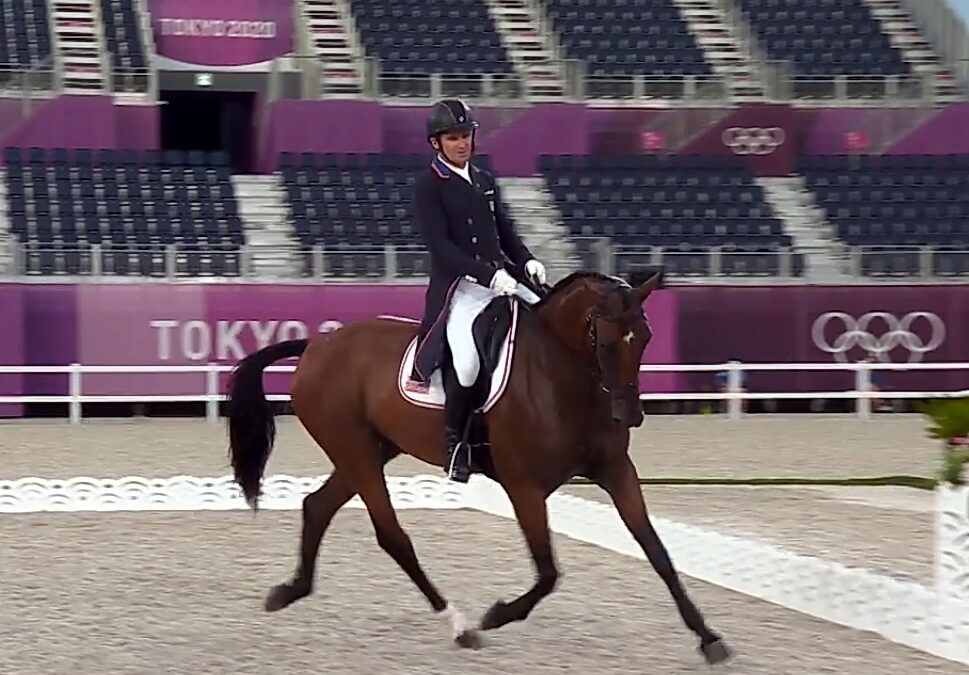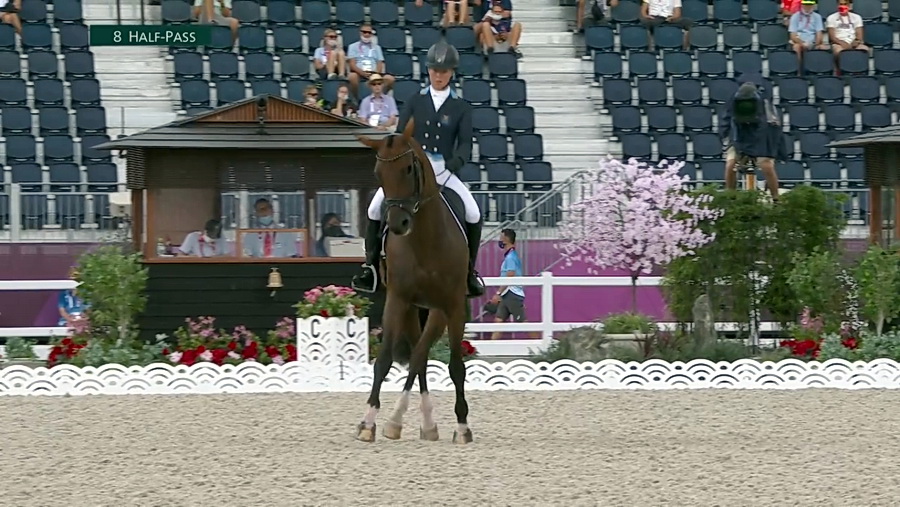(This blog is being updated with the second session of eventing dressage. It starts with the first session and continues into the second session, so keep going down to get the latest information.)
It’s 7:30 p.m Eastern Daylight Time as three-day eventing kicks off at the Tokyo Olympics.\
The test is specially written for the Games, and provides a challenge with movements such as the half-pass to the shoulder-in, which is counter-intuitive (it’s tougher than the other way around.)
I’ll give key scores, so not every entry will be mentioned in this blog, but we certainly will include the leaders and anyone of particular interest.
We’re starting with some important players near the beginning of the order. After the Thai rider, Arinadtha Chavatanont on Boleybawn Prince, made her country’s debut in Olympic eventing with a score of 42.40 penalties, world number one Oliver Townend showed his precision with Ballaghmor Class. Good lead changes, smoothly executed, were typical of this very flowing test, which earned 23.6 penalties. That would be the equivalent of 76.36 percent in a regular dressage score, but that isn’t how they do it in eventing..
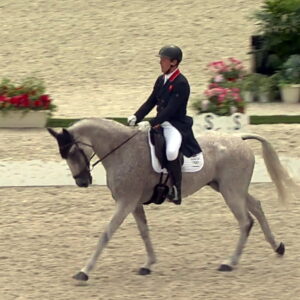
Britain’s Oliver Townend and Ballaghmor Class.
Oliver, like his British teammates, is a 5-star winner, most recently at Land Rover Kentucky in April, but this is his first Olympics. Britain is favored in this Games, and it’s off to a good start.
The USA’s Doug Payne and Vandiver were fulfilling a lifetime ambition by starting in the Games.
The horse, who is by the Trakehner, Windfall, has lovely carriage, but he tossed his head slightly in reactive mode during two lead changes.
Doug, marked at 33 penalties, said, “This is probably about as well as he’s ever done. I think it’s a difficult test for him, everything comes up really quick.
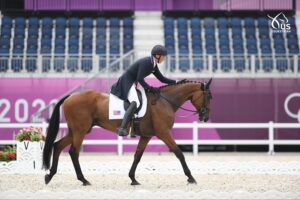
Doug Payne and Vandiver. (Photo courtesy U.S. Equestrian)
“He was about as settled as he’s been in quite a long time. For sure, there’s some stuff you wish you could improve and that’s our job going forward…he’s got a massive heart and always tries his best and for that, you’ve got to be thankful and appreciative.”.
Doug stands 12th and is the only American rider tonight. The dressage phase continues tomorrow morning and tomorrow evening.
The dressage is being done during the coolest times of the day to avoid the worst of Japan’s summer heat and humidity, but the horses can also get a break when they leave the arena from the cooling mist fans that we first saw at the 1996 Olympics in Atlanta.
Felix Vogg of Switzerland and Colera moved smarly to be marked at 26.70.
If you read my eventing preview story on this website, you’ll know I mentioned that the Japanese team shouldn’t be overlooked.
And that was underlined when their first rider, Kazuma Tomoto on Vince de la Vigne, left the ring with a score of 26.1, which elicited a “wow” from me after watching his test.
Kazuma, who is fourth, trains with British Olympic multi-medalist William Fox-Pitt, and it shows.
8:10 p.m. EDT: Alex Hua Tian of China, a pioneer at the international level of the sport for that country, made his Olympic bow in 2008 in appropriately, Hong Kong. His experience showed as he and Don Geniro were marked at 23.90, right behind Oliver. And there they stayed for the remainder of this segment.
Australia’s Shane Rose has been around forever and he and Virgil looked very comfortable with all their experience. Their total was 31.70 to stand 11th.
Sweden’s Therese Viklund had an interesting ride on Viscera, a Hanoverian mare who lost an eye.a while back. (You can see its absence as a black spot in the photo)
It doesn’t seem to bother her; the score of 28.1 was quite nice, good enough for sixth. I’ll be interested to see how she handles cross-country.
The cool thing about the eventing here is the range of countries represented, many more than in Grand Prix dressage. The list includes Thailand, China, Hong Kong, Poland, India, Czech Republic, Belarus and others that we’re not used to seeing. Nice to see that the sport is expanding.
I always advise to never overlook the French in eventing and show jumping, but I did in my preview, since I wasn’t sure this team had what it takes to medal.
Its Rio 2016 gold medalist Thibaut Vallette announced July 9 that he withdrew Qing Du Briot Ifce due to a “slight sensitivity” in one foot.
However, today former reserve rider Christopher Six had very smooth changes with Totem de Brecey and some style (so typical of the French equestrians) to wind up with 29.6 penalties, seventh and the lowest-placed of those who scored less than 30 penalties.
I know you’re never supposed to buy a horse for it’s color, but I’d be tempted by Sam Watson’s Tullabeg Flamendo, a dun with white and black on all four legs, oh so flashy.
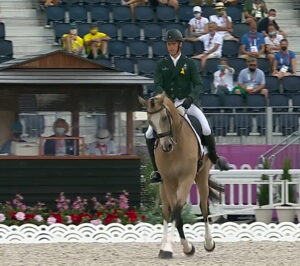
Sam Watson and his perky dun, Tullabeg Flamenco.
Sam you may know as the co-founder of Equiratings. He was wearing a yellow ribbon in memory of Tiggy Hancock, a 15-year-old Irish eventer who died in a fall last June. His 34.20 penalties puts him 14th.
New Zealand’s Jonelle Price and her husband, Tim, comprise half of their country’s team. She was on Grovine de Reve, previously ridden by her countryman Dan Jocelyn, to get marked at 30.70.
9 p.m. EDT: Julia Krajewski of Germany moved into third place behind Alex Hua Tian with Amande de B’Nevelle on 25.20 for a test in which the horse was wholly cooperative, fluid throughout and easy in her flying changes. Julia is the former rider of Chipmunk, who has gone to her multi-medal teammate Michael Jung.
Canada’s only entry is Colleen Loach and Qorry Blue D’Argoges, after Jessica Phoenix declined to present Pavarotti for the horse inspection, after he sustained an injury on his final gallop. This French-bred gray stands at 35.6 penalties, 14th best at this point in the evening (or morning, if you’re in Japan.)
Lauren Billys normally is coached by Derek DiGrazia, who built the cross-country course for the Games, so they are not working together for the Olympics because it would be a conflict of interest (and he wouldn’t have the time, anyway.) She represents Puerto Rico with Castle Larchfield Purdy,,the second-oldest horse in eventing here at age 19.
Her horse was very cooperative, but he stepped forward in the halt. She is on 39.80 penalties to be 17th of 21 in this group.
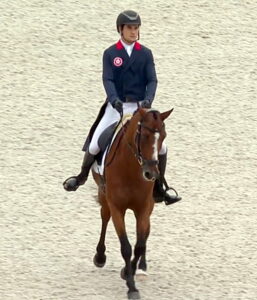
Thomas Heffernan Ho and 20-year-old Tayberry.
The oldest horse, is Tayberry, age 20. He is in 20th place with 46.70 penalties after kicking out in two lead changes and throwing his head quite a bit. He is ridden by Thomas Heffernan Ho, Hong Kong’s first Olympic representative in eventing.
10 p.m. EDT: We’re finished for this round. I’ll be back blogging at 4:30 a.m. EDT Friday, so return to this story to check scores and find out what’s happening as we begin to get an idea of the team totals..
SECOND SESSION
4:30 a.m. EDT: Fouaad Mirza of India and Seigneur started the session with a very impressive test that did their country proud on 28 penalties, the equivalent of 72 percent in pure dressage. It was worth getting up early to see.
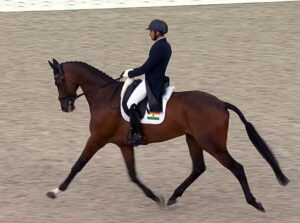
Fouaad Mirza of India and Seigneur.
The former mount of Bettina Hoy of Germany is now under the watchful eye of another German, former world champion Sandra Auffarth. This horse looks every inch a thoroughbred and had a crisp and eager style. This was a ride many competitors would envy.
I mentioned in my comments on the first session of dressage how encouraging it was to see riders from a wider variety of countries than we watched in the Grand Prix dressage competition. But what’s even more encouraging is the quality of riders from countries that are not hotbeds of eventing.
Fouaad is riding as an individual, not as a team member, and a few other individuals followed him.
Peter Flarup of Denmark was on 33.6 penalties with Fascination, while the youngest eventing rider at the Games, 22-year-old Lea Siegel of Austrlia, was marked on 32.6 for DSP Fighting Line’s test.
Thailand’s second rider, Weerapat Pitakanonda on Carnival March (trained by Britain’s Piggy March) withstood the rain to finish on 38.10 penalties.
Britain’s second rider, Laura Collett on London 52, won the 5-star at Pau, France. She nicely added to Oliver Townend’s leading score for her country from the first session. London, the horse she bought as a 5-year-old, is a businesslike horse with a lovely stride.
“He’s been phenomenal all year and I was aiming for (a score of) 21/22. This year, he’s been very close to Ballaghmor Class, but unfortunately it didn’t come off today.”
Laura, who had a bad accident eight years ago, still doesn’t have sight in one eye. That certainly doesn’t stop her. Her mark was 25.80, good enough for fourth at this point and bolstering Britain after two thirds of its team has gone.
From the youngest rider to the oldest–Phillip Dutton at age 57 is the senior U.S.athlete at these Games. This veteran, the individual bronze medalist from Rio 2016, achieved a score of 30 penalties, or 70 percent in Grand Prix dressage terms, with the Zangersheide gelding, Z.
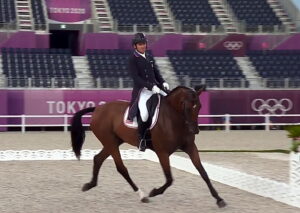
Phillip Dutton and Z.
Phillip turned in a professional performance, as always. Z was on form, though he looked like he was working hard in the lead changes, which are such a big part of the score.
“I was really pleased,” Phillip said, reflecting on his ride.
“I would have liked a bit of a better score, but at the end of the day, my horse went really well and did what I asked, so I can’t be too disappointed. He’s generally a hot horse, but he’s getting more and more seasoned and more and more trained, and I was pretty proud of him actually – there’s no crowd, but you are under the lights, it’s a different situation, and there’s a lot to look at, and he was really in tune with me.
“The great thing about our sport and working with horses is that they keep improving all the time, and if you can keep them competing and sound, then they keep getting better and better, and that’s the way he is. He’s a better, more seasoned horse than he was this time last year.”
The U.S. total is now 63 with two-thirds of the team having performed. The Brits lead with a total of 49.40.
If you look at my eventing preview, the second story on the main page of this website, you’ll note that I said not to count out the Japanese. After all, they were fourth at the 2018 FEI World Equestrian Games, and are proving their mettle again here.
Toshiyuki Tanaka and Talma D’Allou, the second rider for Japan, demonstrated the potential this team may have to make the podium. His score of 32.6 penalties makes the team total 58.7, putting it ahead of the U.S. He trains in England with Angela Tucker.
Australia is just behind the U.S. now on 63.8 with a 32.10 test by Kevin McNab, who was the second reserve to get on the plane.Now the Aussies are very glad to have him here with Don Quidam. Stuart Tinney and Leporis had replaced Chris Burton on the squad, but after the horse inspection, Leporis was deemed not fit to start, so Kevin was called in.
5:40 a.m. EDT: The second Chinese rider, Huadong Sun, earned 35.2 penalties on the Zangersheide mare Lady Chin V’T Moerven Z to put his nation on 59.1 penalties, buoyed by Alex Hua Tian’s 23.9 mark in the first session that remains in the second position to Britain’s Oliver Townend at this moment.
Polish rider Malgorzata Cybulska on Chenaro 2 has 31 penalties, the same mark as Belarus’ individual rider Alexander Zelenko on Carlo Grande Jr. (the names sounds like a person, but trust me, it’s a horse). The Polish team total to this point is 71.20.
5:50 a.m. EDT: Poised flying changes were a highlight of the test by Sweden’s Louise Romeike and Cato 60, a 17-year-old whose rump bore a stencil of the Swedish crown. Her score of 28, which ties with the Indian rider for seventh place, makes the team total 56.10, standing second. Like Britain, Sweden now has two riders in the top 10.
France only has one team member riding here from its 2016 Rio Games gold medal squad. It is on a total of 62.60 after a 33-penalty effort from Absolute Gold (love that name!) and Nicolas Touzaint, whose father and uncle rode in the 1976 Montreal Games. This horse looks as if he needs delicate handling. He was casual in the extended walk but when his rider gathered the reins, it appeared that might light his fuse.
6:15 a.m.: We’ve had several reserves put in as members for their teams. Here’s another, Austin O’Connor on the gray Jaguar Mail son, Colorado Blue, stepping in for Cathal Daniels and Rioghan Rua. Cathal’s horse was pulled for veterinary reasons, but could come back as the reserve if necessary, should her vet report improve.
Colorado Blue performed a classic halt but was a little rushed in the rein-back. I can hear him grinding his teeth; not sure if the judges can.He was rather flamboyant in his first two flying lead changes, and I’m sure his score of 38 reflected that. With two riders in the books, Ireland stands on 72.30 penalties.
6:25 a.m. EDT: Sandra Auffarth, Germany’s individual world champion in 2014, had a few costly errors in her test with Viamant du Matz.
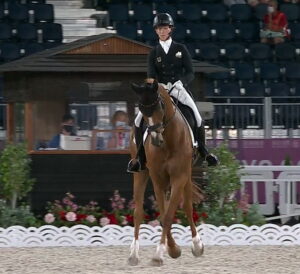
Sandra Auffarth and Viamant du Matz.
Most noticeable was when he struck off on the wrong lead in the canter. He was supposed to be on the counter-lead at that point, but he was on what would have been the correct lead under other circumstances.
So she had to fix that, and then went on moments later to have a flying change that popped a bit too much.
Sandra was marked at 34.10, putting Germany, one of the favorites for gold, on a team total of 59.30. I’ll remind you that she coached the Indian rider who competed earlier in the session and wound up with a better score (28 penalties) than his coach!
7 a.m. EDT: With the second session over (the third and final session starts in 12 and 1/2 hours) I’ll recap. Great Britain holds its team lead on 49.40 penalties, followed by Sweden, Japan (I told you they had potential), China, Germany and New Zealand. The U.S. is ninth on a 63-penalty total, with Doug Payne in 21st place and Phillip Dutton 12th.
The top three haven’t changed since yesterday: World number one Oliver Townend of Great Britain, Alex Hua Tian of China (that’s how China is in fourth place) and Julia Krajewski of Germany.
Oliver led off for his team, noting, “It wouldn’t be my chosen job in life to be pathfinder but at the same time the first bit is out of the way and he’s (Ballaghmor Class) done a very commendable job. So fingers crossed, we keep the work up over the next three or four days and see where we end up”.
Here’s how Oliver assessed the cross-country course: “It’s very intense.You’re always on the climb or camber or in the water, or in a combination.”
Even so, he said, “The questions are extremely fair, it’s very horse- friendly, and if you took each fence individually, there wouldn’t be too many problems. But at the same time, when you add the heat, the terrain, the Olympic pressure and then speed on top of that, it’s going to be causing a lot of trouble and it’s going to be very difficult to get the time.”
“Derek is a horseman to start with, and I think he’s a special, talented man at the job. He wants the horses to see where they are going, there’s no tricks out there. Derek doesn’t try to catch horses out, he builds very see-able questions and lets the terrain and the speed do the job for him.”
I’ll be live blogging the final session, so come back to my website to learn who’s where before we head to the cross-country, where things will change a lot.
.

